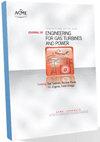低压汽轮机蒸汽膨胀率的实验与数值研究
IF 2.1
4区 工程技术
Q3 ENGINEERING, MECHANICAL
Journal of Engineering for Gas Turbines and Power-transactions of The Asme
Pub Date : 2023-10-11
DOI:10.1115/1.4063711
引用次数: 0
摘要
摘要本文主要研究了蒸汽的膨胀率;采用五级模型汽轮机,通过改变流量和入口温度,改变冷凝段蒸汽的膨胀率,对冷凝效率的影响进行了实验和数值研究。根据实测的壁压和总压,计算了各级静叶的蒸汽膨胀率。此外,通过实测转矩和质量流量对涡轮效率进行了评价,并考虑了流量和冷凝级对冷凝损失的影响。此外,利用ANSYS CFX对非平衡冷凝的影响进行了数值计算。数值计算能够显示成核情况的细节和由此产生的流动模式的变化。过冷损失的数值计算表明,不同质量流量的过冷损失没有差异。根据测量结果对蒸汽膨胀率进行评估,发现由于质量流量的不同,蒸汽膨胀率没有差异。这与过冷损失不随流量变化的数值结果相对应。本文章由计算机程序翻译,如有差异,请以英文原文为准。
Experimental and Numerical Investigations of Steam Expansion Rate in Low Pressure Steam Turbine
Abstract This study focused on the expansion rate of steam; the effect on efficiency was investigated experimentally and numerically by varying the expansion rate of steam in the stage where condensation occurs by varying the flow rate and inlet temperature using a five-stage model steam turbine. The steam expansion rate of the stator blades in each stage was evaluated from the measured wall pressure and total pressure. In addition, the turbine efficiency was evaluated from the measured torque and mass flow rate, and the effect of flow rate and condensing stage can be taken into account for losses caused by condensation. In addition, numerical calculations to account for the effects of non-equilibrium condensation were performed using ANSYS CFX. The numerical calculations were able to show the details of the nucleation situation and the resulting changes in flow patterns. Numerical evaluation of the subcooling loss showed that there was no difference in subcooling loss between different mass flow rates. The steam expansion rate was evaluated from the measurement results, and it was found that there was no difference in the steam expansion rate due to differences in mass flow rate. This corresponds to the numerical result that the subcooling loss does not vary with flow rate.
求助全文
通过发布文献求助,成功后即可免费获取论文全文。
去求助
来源期刊
CiteScore
3.80
自引率
20.00%
发文量
292
审稿时长
2.0 months
期刊介绍:
The ASME Journal of Engineering for Gas Turbines and Power publishes archival-quality papers in the areas of gas and steam turbine technology, nuclear engineering, internal combustion engines, and fossil power generation. It covers a broad spectrum of practical topics of interest to industry. Subject areas covered include: thermodynamics; fluid mechanics; heat transfer; and modeling; propulsion and power generation components and systems; combustion, fuels, and emissions; nuclear reactor systems and components; thermal hydraulics; heat exchangers; nuclear fuel technology and waste management; I. C. engines for marine, rail, and power generation; steam and hydro power generation; advanced cycles for fossil energy generation; pollution control and environmental effects.

 求助内容:
求助内容: 应助结果提醒方式:
应助结果提醒方式:


